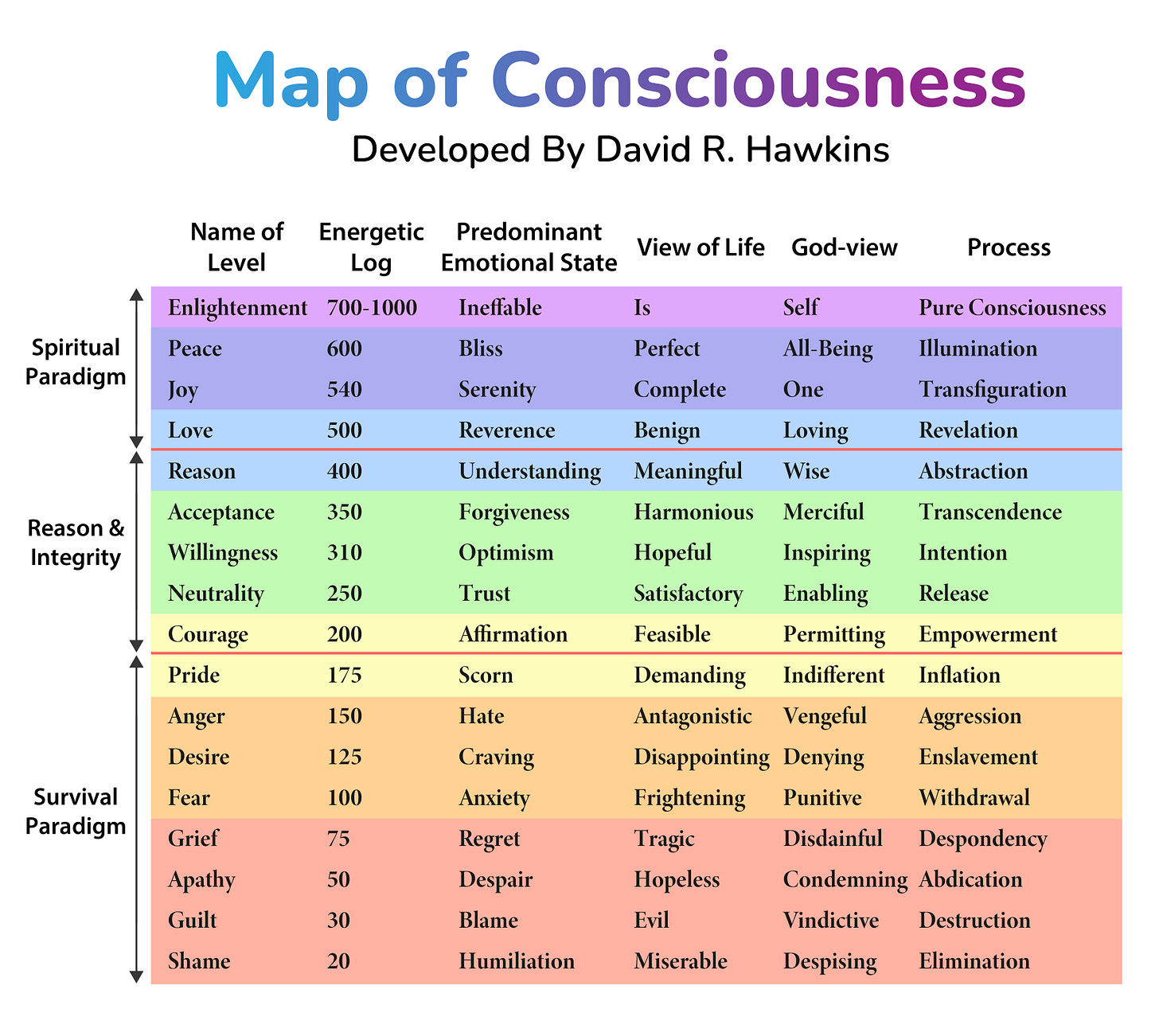The Collective Consciousness Crisis
The Forgotten Superpower
Someone recently asked me what was missing from the world. The answer came surprisingly clear: conscious individuals - people willing to actively pursue a rise in consciousness.
Consciousness is perhaps our most overlooked superpower. When we’re truly conscious, we experience negative feelings not as enemies to avoid, but as passing visitors to observe.
Most people view consciousness as binary: you’re either conscious (awake) or unconscious (asleep). This oversimplification misses a crucial truth: consciousness exists on a continuum. The real question isn’t whether you’re conscious, but rather: how conscious are you?
Dr. David Hawkins laid out this concept through his groundbreaking Map of Consciousness, which measures consciousness on a scale from 0 to 1000.

While enlightenment (1000) represents the peak of human consciousness, understanding the lower levels reveals why so many struggle:
- Shame (20): Living in humiliation, feeling worthless
- Guilt (30): Trapped in self-punishment and regret
- Apathy (50): Characterized by hopelessness
- Grief (75): Overwhelmed by loss and despair
- Fear (100): Seeing threats everywhere
- Desire (125): Endlessly chasing pleasure and gain
- Anger (150): Using force to overcome fear
- Pride (175): Believing in one’s superiority
- Courage (200): Recognizing your inner negative feelings. The first level where effective positive action becomes possible.
What makes this map so revealing isn’t just its structure – it’s the recognition that 85% of humanity lives below the level of Courage, according to Dr Hawkins. Think about that: the majority of people operate from states dominated by fear, desire, or pride rather than genuine empowerment.
When Feelings Run the Show
We can see that in our daily lives, right? That person in her car angry because someone passed her, that CEO that never seems to have enough money, that person that cries over a mistake she made although no one actually cares.
These aren’t just isolated incidents; they’re symptoms of our collective consciousness crisis. When we’re stuck at these lower levels, we become prisoners of our own reactions.
- The angry driver isn’t really mad about being passed – they’re acting out a deeper pattern of fear and pride.
- The CEO isn’t really seeking more money – they’re trying to fill an inner void that no amount of wealth can satisfy.
- The person dwelling on their mistake isn’t really concerned about others' judgments – they’re caught in a web of self-punishment that serves no purpose.
To recognize these unconscious patterns and make them conscious is claiming responsibility for your own feelings. This is what Hawkins describes as reaching the level of Courage. At this level, we finally begin to see our emotional reactions for what they are, rather than being controlled by them.
When feelings like fear or hatred arise, we let them be and let them disappear by themselves rather than being consumed by them. This awareness prevents these feelings from controlling our behavior, making a difference in how we navigate life.
The Art of Conscious Living
My own journey with consciousness began when I noticed how much of my life was spent in overthinking. When interested in a girl, I’d loop on the same thoughts endlessly. When I had a promising business idea, I’d get stuck planning the perfect version rather than actually starting.
I’ve always been a creative and smart guy, but my unconscious feelings made me surprisingly stupid in real life. When I finally did act, it was from fear, desire, pride - never clarity. Imagine a supercomputer running the same calculations over and over, only to crash when it finally executes - that was me.
I discovered that simply by observing these patterns – without judgment – was the first step toward changing them. It’s like turning on a light in a dark room; the darkness doesn’t need to be fought, it naturally dissolves in the presence of awareness.
So here’s a fun thought: what if the next time you catch yourself raging at traffic, stalking your ex’s LinkedIn ‘for professional reasons’, or stress-eating your fourth cookie, you just say “Oh, hello there, unconsciousness, up to your old tricks?” and watch what happens?
Think of consciousness as your personal superpower – not the kind that lets you fly or become invisible, but the kind that lets you see through the matrix of your own patterns. And unlike other superpowers, this one’s free, available 24/7, and doesn’t require a radioactive spider bite.
The world doesn’t need more perfect people. It needs more conscious ones – people willing to watch their own show with curiosity rather than judgment. After all, what’s missing isn’t the capacity for consciousness – we all have that. What’s missing is the willingness to use it.